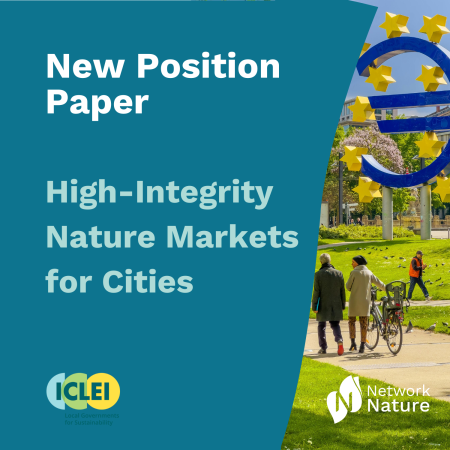
European cities face rising heatwaves and floods, yet nature may hold the key to resilience. Green roofs, urban forests and restored soils don’t just cut carbon - they also cool streets, clean the air and boost residents’ wellbeing. With more than 75% of Europeans living in cities, scaling these solutions could transform urban life.
Nature-based Solutions (NbS), such as green roofs, urban forests, soil restoration, regenerative agriculture and green corridors, can play a pivotal role in addressing societal challenges. These solutions capture carbon, enhance biodiversity, reduce heat stress, regulate water cycles and improve air quality, all the while strengthening public health, local food systems and social cohesion. In short, NbS make cities and regions more resilient and more liveable. However, unlocking these multiple benefits requires scaling up investment in NbS, which remains a challenge for many localities.
Despite the significant benefits of NbS, financing remains severely limited. Studies indicate that only a small proportion of urban NbS projects currently attract investment from the private sector. Across Europe, the estimated annual funding gap for implementing urban NbS projects is around €19 billion, highlighting the urgent need for innovative financing mechanisms. Without targeted support and investment, many cities will struggle to increase the scale of their NbS projects to the level required to meet their climate, biodiversity and resilience goals.
Voluntary nature markets can unlock private sector finance to increase the scale of urban NbS projects. These markets create opportunities for cities to generate measurable benefits, such as carbon storage, enhanced biodiversity and improved soil and water quality, while also mobilising private capital. Nature markets must be designed with integrity and oversight to ensure they:
- Achieve real, additional and lasting environmental outcomes that go beyond business as usual.
- Include social and biodiversity safeguards to prevent greenwashing and negative social impacts.
- Ensure the equitable participation of local governments, communities and smaller municipalities.
- Complement urgent direct emissions reductions alongside investment, maintaining a focus on mitigation.
High-integrity nature markets can transform urban ecosystems into sources of innovation, investment, and co-benefits. Cities can aggregate smaller nature-based solutions (NbS) projects into investable pipelines, establish transparent governance, and ensure that benefits reach local communities. Urban forests, street trees and green roofs, for example, can serve as carbon sinks on a neighbourhood scale while cooling cities during heatwaves and providing habitats for urban wildlife. Similarly, soil restoration and regenerative urban agriculture can sequester carbon, improve urban food systems, and foster stronger connections between communities and local nature.
Local authorities can play an important role as trusted intermediaries, working alongside citizens, NGOs and businesses to co-create NbS projects. This approach ensures local buy-in, strengthens social acceptance and fosters ownership of projects. Urban and peri-urban NbS projects are particularly effective as they deliver multiple co-benefits simultaneously, such as climate mitigation, biodiversity enhancement, improved public health, urban cooling and flood management.
By adopting high-integrity nature markets, cities can attract private investment to increase the scale of NbS projects, reducing their reliance on public budgets while contributing to Europe’s climate-neutral, nature-positive and resilient future. A recent position paper from ICLEI Europe is calling for EU policy measures that integrate urban NbS into voluntary certification frameworks, embed social and environmental safeguards, support equitable participation and build local capacity to access and manage finance.
The central message is clear: if carefully designed and governed, high-integrity nature markets are strategic tools that can unlock finance for urban nature, enabling greener, healthier and more resilient cities across Europe. These markets provide a way for cities to combat climate change, safeguard biodiversity, improve public health, and develop vibrant, liveable urban spaces, all while attracting private investment and nurturing inclusive local economies.
For more information, read ICLEI Europe’s new Position Paper, 'High-Integrity Nature Markets for Cities.'